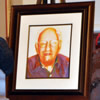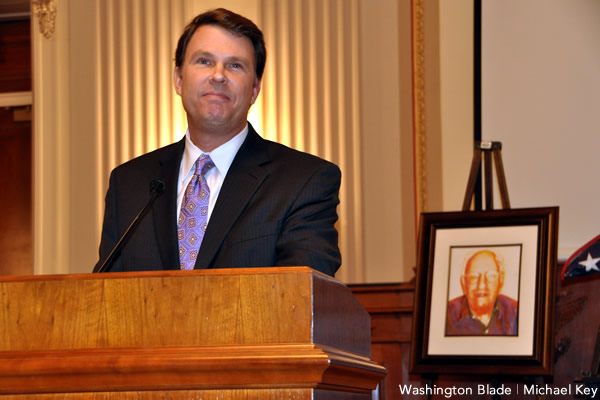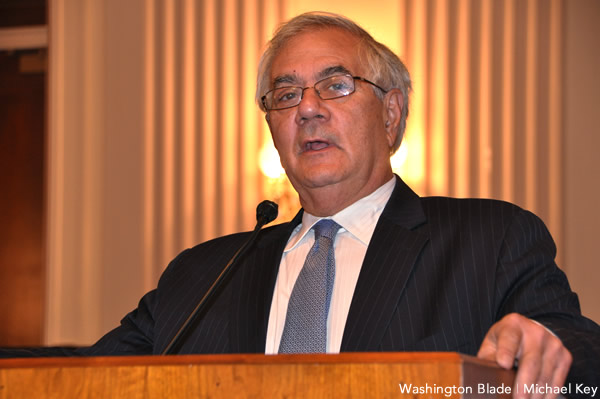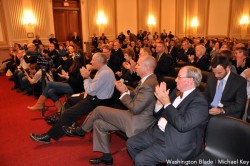Local
Kameny honored in memorial service on Capitol Hill
Members of Congress join LGBT community in remembering pioneer activist


Director of the Office of Personnel Management, John Berry, addresses the attendees at the memorial service for Frank Kameny. (Washington Blade photo by Michael Key)
In a memorial service on Capitol Hill Tuesday night, three members of Congress, an Obama administration official, and a Yale Law School professor described the late gay rights leader Frank Kameny as a major figure in the U.S. civil rights movement who changed the course of history for LGBT Americans and the nation.
More than 200 people turned out for the service, which was held in the historic caucus room at the Cannon House Office Building across the street from the U.S. Capitol.
“His life cleared the path that I and countless others followed into public service,” said John Berry, the director of the U.S. Office of Personnel Management, who in 2009 became the Obama administration’s highest-level gay appointment.
“His unrelenting and unceasing fight for gay rights enabled other Americans to step out of the closet and into the full light of equality,” Berry told the gathering. “But most importantly, his long battle and eventual triumphs show the miracles that one person wrought upon the world.”
Berry’s sentiment was echoed by gay U.S. Reps. Barney Frank (D-Mass.) and Tammy Baldwin (D-Wisc.), Congressional Delegate Eleanor Holmes Norton (D-D.C.), and Yale Law School Professor William Eskridge Jr. Each told of how Kameny’s 50-year tenure as the nation’s preeminent gay rights strategist and advocate changed the course of the nation’s history and improved the lives of LGBT people and other Americans.
Gay rights advocate and Kameny friend Charles Francis said he and others who organized the memorial service chose to hold it on Nov. 15 to commemorate the 50th anniversary of Kameny’s co-founding of the Mattachine Society of Washington, D.C. Gay historians consider Mattachine of Washington to be D.C’s and the nation’s first homosexual civil rights organization.
Francis noted that Kameny and fellow activist Jack Nichols started the organization in 1961 not long after the Cannon Caucus Room, where Kameny’s memorial service was being held, was the site of the House Un-American Activities Committee’s widely publicized hearings in which communists and homosexuals were said to be a threat to the nation.
Eskridge praised Kameny’s role as a legal strategist and noted that Kameny waged one of the first effective efforts to repeal state sodomy laws, which classified gay sex as a crime. Eskridge and Norton, who called Kameny a civil rights champion, each compared the gay rights leader to American civil rights heroes in the black civil rights movement such as Rosa Parks and Thurgood Marshall.
Norton said that Kameny’s decision to become the first known gay person to fight his dismissal on grounds of homosexuality from his federal government job as an astronomer in 1957 was similar to Rosa Parks’ refusal to sit in the back of the bus as an act of defiance of the South’s segregation laws.
“He wore that dismissal as a badge of honor,” Norton said. “It is Frank’s lonely act of defiance that sets him apart” at a time when it was unthinkable for gays to stand up for their rights, she said.
Eskridge said Kameny’s work to advance legal rights for LGBT people in the early years of his activism in the 1960s was especially remarkable because he wasn’t a lawyer.
He said that in 1961 Kameny became the first in the U.S. civil rights movement to argue that sexual orientation should be treated the same as race in connection with laws and policies that ban discrimination.
“Those were remarkably good arguments,” said Eskridge. “Today they can get you tenure at a university. But back then they could land you in jail.”
Rep. Frank said Frank Kameny was an inspiration and role model for him at a time when he grappled with how his own status as a gay man would impact his plans to enter the realm of politics and run for public office in Massachusetts.
Frank said one of Kameny’s many accomplishments in the gay rights movement was his self-confidence and aggressive and assertive demeanor in informing the world that his cause was just and right.
“He was certainly the opposite of the stereotype of a gay person as a shrinking violet,” Frank said.
Baldwin said she, too, considered Kameny a role model in her own coming out as a lesbian interested in becoming involved in public affairs and politics.
“My own introduction to Frank came when I was in college,” she said. “I was just coming out. I sought everything I could find to read about our LGBT leaders… And what I learned about Frank Kameny, the Mattachine Society and so many other pioneers made me incredibly proud,” she said.
Berry, who delivered the main eulogy for Kameny at the memorial service, said he had the honor as head of the U.S. Office of Personnel Management to extend to Kameny a formal apology on behalf of the government for Kameny’s dismissal from government service in 1957.
“The apology closed an important cycle in his life’s work,” said Berry, who noted that it came more than 50 years after Kameny has been credited with initiating and living to see a long list of changes that have improved the lives of LGBT people.
An end to a government ban on granting security clearances to gays, the end of the ban on gays from serving in the military, the elimination of anti-gay sodomy laws, and the removal of the psychiatric profession’s classification of homosexuality as a mental disorder are all actions that Kameny played a key role in bringing about, Berry said.
“We have lost one of the great champions of truth. His life was long and full, his victories many and great. He has left his mark upon the world, and its stewardship falls to us now,” Berry told the gathering.
“The end of Frank’s avenue must not be the end of ours. We must continue on the journey forward. It is up to us to carry on the battles yet un-won, to write history and guard the future and to morn this great soul.”
Among those attending the Kameny memorial service were gay U.S. Reps. Jared Polis (D-Colo.) and David Cicilline (D-R.I.), who, along with Norton, Frank, and Baldwin, served as official congressional hosts for the event. Also attending were Gautam Raghavan, associate director of public engagement at the White House, who serves as White House liaison to the LGBT community; White House press spokesperson Shin Inouye; and D.C. Council members David Catania, Jim Graham, and Mary Cheh.
District of Columbia
Deon Jones speaks about D.C. Department of Corrections bias lawsuit settlement
Gay former corrections officer says harassment, discrimination began in 1993

Deon Jones says he is pleased with the outcome of his anti-gay bias lawsuit against the D.C. Department of Corrections that ended after five years on Feb. 5 with the D.C. government paying him $500,000 in a settlement payment.
The lawsuit, filed on his behalf by the American Civil Liberties Union of D.C. and the international law firm WilmerHale, charged that Jones, a Department of Corrections sergeant, had been subjected to years of discrimination, retaliation, and a hostile work environment because of his identity as a gay man in clear violation of the D.C. Human Rights Act.
A statement released by the ACLU at the time the settlement was announced says Jones, “faced years of verbal abuse and harassment, from co-workers and incarcerated people alike, including anti-gay slurs, threats, and degrading treatment.”
The statement adds, “The prolonged mistreatment took a severe toll on Jones’s mental health, and he experienced depression, post-traumatic-stress disorder, and 15 anxiety attacks in 2021 alone.:
Jones said the harassment and mistreatment he encountered began in 1993, one year after he first began work at the Department of Corrections and continued for more than 25 years under six D.C. mayors, including current Mayor Muriel Bowser, who he says did not respond to his repeated pleas for help.
Each of those mayors, including Bowser, have been outspoken supporters of the LGBTQ community, but Jones says they did not intervene to change what he calls the homophobic “culture” at the Department of Corrections.
The Department of Corrections, through the Office of the D.C. Attorney General, which represents city agencies against lawsuits, and the mayor’s office, have so far declined to comment on the lawsuit and the half million-dollar settlement the city offered to Jones, who accepted it.
Among other things, the settlement agreement states that Jones would be required to resign from his job at the Department of Corrections. It also declares that “neither the parties’ agreement nor the District government’s offer to settle the case shall in any way be construed as an admission by the District that it or any of its current or former employees, acted wrongfully with respect to plaintiff or any other person, or that plaintiff has any rights.”
Scott Michelman, the D.C. ACLU’s legal director said that type of disclaimer is typical for parties that agree to settle a lawsuit like this. He said the city’s action to pay Jones a half million-dollar settlement “speaks louder than words.”
With that as a backdrop, Jones reflected on the settlement and what he says was his tumultuous 30-year career as an employee at the D.C. Department of Corrections in a Feb. 9 interview with the Washington Blade.
He and Michelman pointed out that Jones was placed on paid administrative leave in April 2022, one year after his lawsuit was filed. Among his upcoming plans, Jones told the Blade, is to publish a podcast that, among other things, will highlight the hardship he faced at the Department of Corrections and advocate for LGBTQ rights.
BLADE: What are your thoughts on this lawsuit settlement which appears very much in your favor?
JONES: That’s great. I’m happy. I’m glad to resign. It’s been a long time coming. It was the worst time it’s ever been. And I have advocated for the community for many, many years. And not only standing up for my rights but for the rights for others in the LGBTQ community.
And I’m just tired now. And my podcast will start soon. And I will continue to advocate for the community.
BLADE: Can you tell a little about that and when it will begin?
JONES: Once in April, once everything is closed my podcast will be starting. And that’s Deon’s Chronicle and Reveal. Yes, my own podcast.
BLADE: Since we have reported your attorney saying you have been on administrative leave since March of 2022, some in the community might be interested in what you have been doing since that time. Did you get another job or were you just waiting for this case to be resolved?
JONES: I was waiting for this to be resolved. I couldn’t work. That would violate policy and procedures of the D.C. government. So, I could not get another job or anything else.
BLADE: You have said under administrative leave you were still getting paid. You were still able to live off of that?
JONES: Yes, I was able to. Yes, sir. I used to do a lot of overtime. As a zone lieutenant for many years, I have supervised over 250 officers. I’ve also supervised over 25,000 inmates in my 30 years.
BLADE: How many years have you been working for the Department of Corrections?
JONES: It’s 30 years all together. I started down at the Lorton facility. Six facilities — I’ve worked for past directors, deputy directors, internal affairs. I’ve done it all.
BLADE: Do you have any plans now other than doing the podcast?
JONES: Well, to just do my podcast and also to write my book and my memoir inside of the house of pain, the house of shame — what I’ve been through. When I start my podcast off it will be stories — Part 1 through Part 4. And I will go back to the Lorton days all the way up to now. When it first started was sexual harassment and discrimination back down at Lorton. And I mean this has just been the worst time around.
BLADE: So, did you first start your work at the Lorton Prison?
JONES: Yes, I was at the central facility, which was the program institution.
MICHELMAN: Just for context. You may remember this, but the Lorton facility was where D.C. incarcerated people were held. So, that was part of the D.C. Department of Corrections.
BLADE: Yes, and that was located in Lorton, Va., is that right?
JONES: Right.
BLADE: Didn’t that close and is the main incarceration facility is now in D.C. itself?
JONES: Yes. And that closed in 2001.
BLADE: I see. And is the main D.C. jail now at a site near the RFK Stadium site?
JONES: Yes, sir. And next-door is the correctional treatment facility as well.
BLADE: So, are you saying the harassment and other mistreatment against you began back when you were working at the Lorton facility?
JONES: At the Lorton central facility. And they used to flash me too. When I say flash me like the residents, the inmates were flashing. And they [the employees] were flashing.
BLADE: What do you mean by flashing?
JONES: They take their penis out and everything else. I mean the sexual harassment was terrible. And I came out then down there. And I continued to advocate for myself and to advocate for other people who I was told were being picked on as well.
BLADE: As best you can recall, where and what year did that happen?
JONES: That was back in 1993 in April of 1993.
BLADE: The mayor’s office has declined to comment on the settlement and payment the city is giving you. Yet they have always said they have a strong policy of nondiscrimination protections for LGBTQ people in D.C. government agencies. But do you think that was not carried out at the Department of Corrections?
JONES: That’s a blatant reason why — I had 13 anxiety attacks. It was so blatant. Can you imagine? On the airwaves or the walkie-talkies — everybody had a walkie talkie — the captains and the majors and everything. And you transmit it to the command center or something like that. When you finish someone gets on the air and calls you a sissy or a fag.
They received so many complaints, and I also sent the mayor so many emails and begging for help. And they ignored it. They didn’t address any complaints at all. So, that’s bull.
BLADE: But now after you filed your lawsuit and you received this settlement do you think there will be changes there to protect the rights of other LGBTQ employees?
JONES: I hope so, because I have been defending community rights. For many years I have been advocating for different things and different services. And I’ve seen the treatment. There are a lot of mistreatments towards the community over there. And I have taken a stance for a lot of people in the community and protecting their constitutional rights as well as mine.
BLADE: What advice might you have for what the Department of Corrections should do to correct the situation that led to your lawsuit?
JONES: Well, what my advice for the department is they need to go back over their training. And they need to enforce rules against any acts of discrimination, retaliation, or sexual harassment. They need to enforce that. They’re not enforcing that at all. They’re not doing it at all. And this time it was worse than ever, then I’ve ever seen it. That you would get on the walkie talkie and someone would call you a fag or a sissy or whatever else or do evil things and everything. They are not enforcing what they are preaching. They are not enforcing that.
BLADE: Is there any kind of concluding comment you may want to make?
JONES: Well, I hope that this litigation will be a wakeup call for the department. And also, that it will give someone else the motivation to stand up for their rights. I was blessed to have the ACLU and WilmerHale to protect my constitutional rights. So, I am just really happy. So, I’m hoping that others will stand up for their rights. Because a lot of people in the community that worked there, they were actually afraid. And I had some people who actually quit because of the pressure.
Baltimore
‘Heated Rivalry’ fandom exposes LGBTQ divide in Baltimore
Hit show raises questions about identity, cultural representation

By JOHN-JOHN WILLIAMS IV | “Heated Rivalry,” the surprise gay hockey romance that has captivated global audiences and become a cultural phenomenon, has inspired sold-out parties celebrating the characters from the steamy series, including in Baltimore.
For some, love of the show has exposed the loss of a once-vibrant gay nightlife in Charm City and splintered its LGBTQ community. It also brings up layered questions about identity, cultural representation, and the limits of identity politics.
In Baltimore, the majority of the parties also appear to be missing a key ingredient that has been a part of the show’s success: gay men at the helm. Last month, women hosted a dance party at Ottobar, a straight establishment.
The rest of this article can be read on the Baltimore Banner’s website.
Virginia
McPike wins special election for Va. House of Delegates
Gay Alexandria City Council member becomes 8th LGBTQ member of legislature

Gay Alexandria City Council member Kirk McPike emerged as the decisive winner in a Feb. 10 special election for a seat in the Virginia House of Delegates representing Alexandria.
McPike, a Democrat, received 81.5 percent of the vote in his race against Republican Mason Butler, according to the local publication ALX Now.
He first won election to the Alexandria Council in 2021. He will be filling the House of Delegates seat being vacated by Del. Elizabeth Bennett-Parker (D-Alexandria), who won in another Feb. 10 special election for the Virginia State Senate seat being vacated by gay Sen. Adam Ebbin (D-Alexandria).
Ebbin is resigning from his Senate next week to take a position with Virginia Gov. Abigail Spanberger’s administration.
Upon taking his 5th District seat in the House of Delegate, McPike will become the eighth out LGBTQ member of the Virginia General Assembly. Among those he will be joining is Sen. Danica Roem (D-Manassas), who became the Virginia Legislature’s first transgender member when she won election to the House of Delegates in 2017 before being elected to the Senate in 2023.
“I look forward to continuing to work to address our housing crisis, the challenge of climate change, and the damaging impacts of the Trump administration on the immigrant families, LGBTQ+ Virginians, and federal employees who call Alexandria home,” McPike said in a statement after winning the Democratic nomination for the seat in a special primary held on Jan. 20.
McPike, a longtime LGBTQ rights advocate, has served for the past 13 years as chief of staff for gay U.S. Rep. Mark Takano (D-Calif.) and has remained in that position during his tenure on the Alexandria Council. He said he will resign from that position before taking office in the House of Delegates.




















